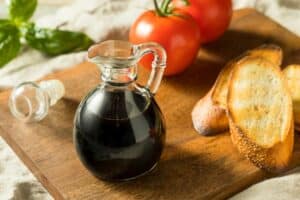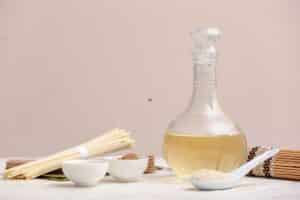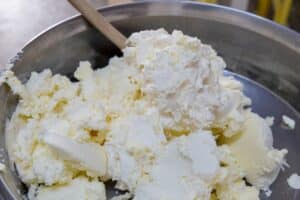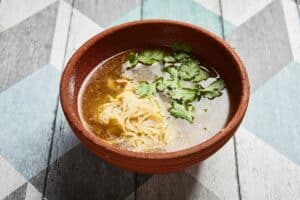Rice wine is a great ingredient in cooking–it has a sweet and complex flavor profile and works well in a lot of recipes. However, it’s not always an ingredient that you have on hand. If you need a Chinese rice wine substitute in a recipe, what should you use?
The best rice wine alternatives are sake, white wine, cooking sherry, gin, and white grape juice. While none of these are quite the same as rice wine, they work in specific situations and are excellent substitutes for rice wine.
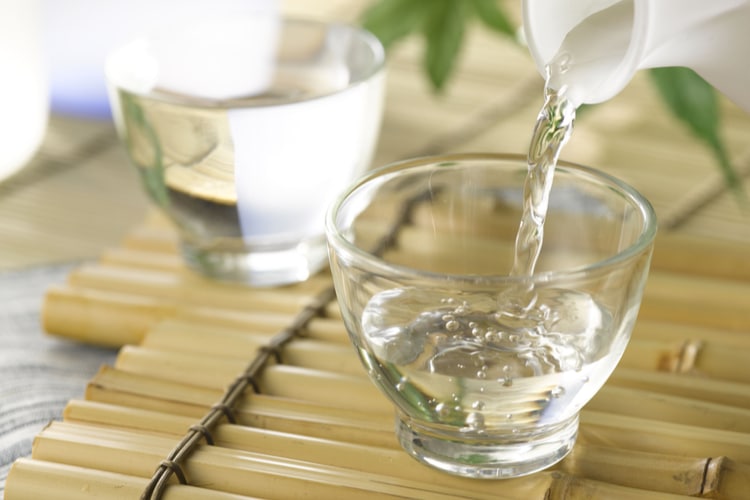
5 Recommended Rice Wine Substitutes
There are several kinds of rice wine, but the wine most commonly used in cooking is Chinese rice wine or Shaoxing wine. This cooking wine wasn’t created for drinking, so it is not the same as Japanese rice wine, such as sake or mirin. Shaoxing wine is sold in most grocery stores and oriental markets.
While there are many rice cooking wine substitutes, a few are better than others. The key to finding an acceptable substitute for an ingredient is to match its purpose and taste as much as possible.
In a recipe, rice wine works to deepen the flavor profile of sauces and broths, tenderize meat, and increase the overall taste of the dish.
Any substitute should do the same thing. Although no single ingredient on this list will do this quite as well as rice wine, these alternatives act similarly in important ways. They each will add a depth of flavor and help the texture of your recipe.
Cooking Sherry
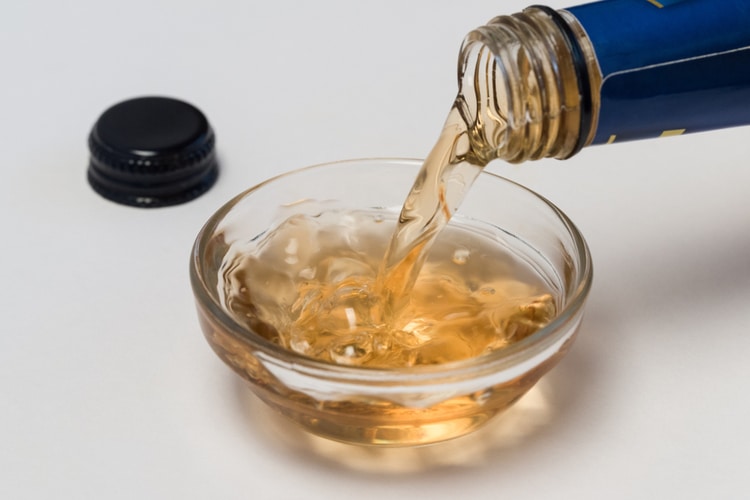
Dry cooking sherry is one of the best substitutes for rice wine. It has the same depth of flavor as rice wine but tastes different.
Instead of being based on rice, sherry is fermented from grapes. This gives it a heavier and sweeter flavor, but it is still based on alcohol and will do the same thing chemically to the recipe.
Sherry is a fortified wine and has spirits added to it. It’s stronger than rice wine, so only use it if the recipe already has strong flavors. Anything with delicate flavors will be overpowered by the deep and rich flavor profile of the sherry.
When substituting cooking sherry for rice wine, use about half of the amount that the recipe calls for. You cannot replace this on a one-to-one basis because it’s so strong.
If you want a lower alcoholic content, use a little less sherry. Naturally, sherry has a higher alcohol level than Chinese rice wine, so it might overpower the rest of the recipe.
When using sherry to replace rice wine, make sure that you are using dry sherry. Cream sherry is sweet and has cream in it–it is good in some recipes, but doesn’t work in the same way that rice wine does. Dry sherry is much closer to rice wine.
Sake

If you don’t have Chinese rice wine, Japanese rice wine is your next best option. While sake is not the same as cooking rice wine (it’s sweeter and has a different flavor profile), it will work the same way in recipes.
You can use the same amount of sake that the recipe calls for. However, sake has a higher alcohol content, so it might be better to put three-quarters of the amount called for.
This way, the flavor and alcohol content of the sake doesn’t overpower your recipe. If it’s a liquid sauce or marinade, dilute the sake with water.
Other Japanese rice wines would work as well. Sake is the most common, but mirin is another cooking wine that is light like Chinese rice wine and works perfectly well as a substitute. Any rice wine will have the most similar flavor to Chinese rice wine.
Sake is not the same as Shaoxing, even though it has the most similar profile. Because Chinese rice wine was created for cooking, it is lighter and nuttier. Sake is sweeter and heavier in alcohol and will change the dish’s taste.
White Wine

White wine is another excellent option for replacing rice wine. It’s lighter than sherry and will do well if you don’t have sherry or sake on hand.
It also has a similar alcohol level, so you won’t have to worry about diluting it or adding water. However, white wine has a completely different flavor profile.
While white wine will add a subtle alcohol flavor, it won’t taste the same as rice wine. If you use white wine, make sure you use dry wine. A sweet wine won’t work and will overpower the entire recipe with its sweetness. Dry cooking wine is best.
Cooking wine is the best option for rice wine replacement, but you can use a dry drinking wine if you are desperate. It will be a more robust flavor and have higher alcohol content. Drinking wine (even dry drinking wine) is much sweeter than cooking wine, so adjust your recipe accordingly.
Gin

Of course, gin is a very strong alcohol. However, it has several of the same notes as rice wine and similarly works to flavor recipes.
While it doesn’t have the same flavors as rice wine, it is closer than white wine or sherry. The only more accurate option is sake or another rice wine.
Gin is pure alcohol and will overpower any recipe very quickly. If you use gin to replace rice wine, only use a tiny amount.
Replace the rest of the liquid with water. You can adjust this, depending on the recipe. Gin wouldn’t work well in marinades or sauces unless cooked.
Gin burns very easily, so it’s essential to keep a close eye on any recipe you cook with liquor. Even if it’s a teaspoon of gin, it can burn off very quickly and leave a singed taste throughout the entire recipe.
White Grape Juice
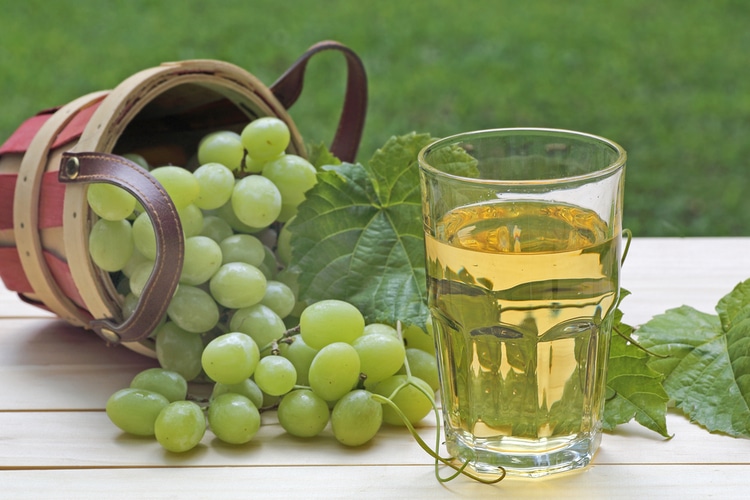
Lastly, white grape juice has the same acidic notes and sweetness as wine but adds more sweetness and fruit flavor. Using grape or apple juice instead of any wine will make a very different sauce than intended. However, this isn’t necessarily a bad thing.
Grape juice is a great option if you are trying to make a recipe non-alcoholic or don’t keep alcohol in the house. Grape juice has a fruity flavor and rice wine is nutty and less sweet; the acidity in the fruit juice does add flavor and depth. Apple juice is also a great option.
To use white grape or apple juice instead of rice wine, dilute it with water. This isn’t because it’s too strong for the recipe–there’s no alcohol at all.
Instead, fruit juice has too much sugar and will overpower the other flavors in the dish. Don’t use apple or white grape juice if your recipe is exceptionally delicate.
Frequently Asked Questions
Of course, substituting rice wine in a recipe is a complicated process. Sometimes you can put the new ingredient in on a one-to-one basis.
Other times, it’s necessary to dilute it with water, add species, or change the recipe entirely. Here are some commonly asked questions about rice wine and its substitutes in recipes.
Can you leave rice wine out of a recipe?
Depending on the recipe, it is possible to leave out the rice wine. However, this will throw off the taste and composition of the result. If you are making a sauce or a marinade, you need the same amount of liquid to create the correct consistency and ratio of sauce.
At the very least, it’s recommended to replace rice wine with some form of liquid. Usually, another wine or fruit juice is the best, because that will mimic the flavor and function of rice wine the best.
However, you can experiment with other ingredients or substitute with water if you’re feeling adventurous.
Can I use white vinegar instead of rice wine?
While white rice vinegar and rice wine are named similarly, they are not the same and shouldn’t be used interchangeably. Vinegar is extremely acidic and has a different texture and flavor profile. Made by fermenting rice with a little bit of rice wine, rice vinegar doesn’t retain any alcoholic taste.
Do not replace rice wine with white vinegar because it will make your dish much more acidic and tart. The chemistry of the cooking process will change dramatically. Instead, use another form of cooking wine or fruit juice to complete the recipe.
What does rice wine do to food?
Rice wine is generally used in marinades and sauces. Like all alcohol, it adds to the flavor and texture of a sauce or dish.
However, rice wine does more than this. It adds a depth of flavor and seasoning unique to rice wine. This is why it’s so popular in Chinese and Japanese food, second only to soy sauce.
Rice wine is an essential part of many recipes. You might find that the recipe isn’t the same without rice wine, and hold off making it until you’re able to buy more.
However, these substitutes can do the same job in the recipe and mimic the original taste at least a bit.

